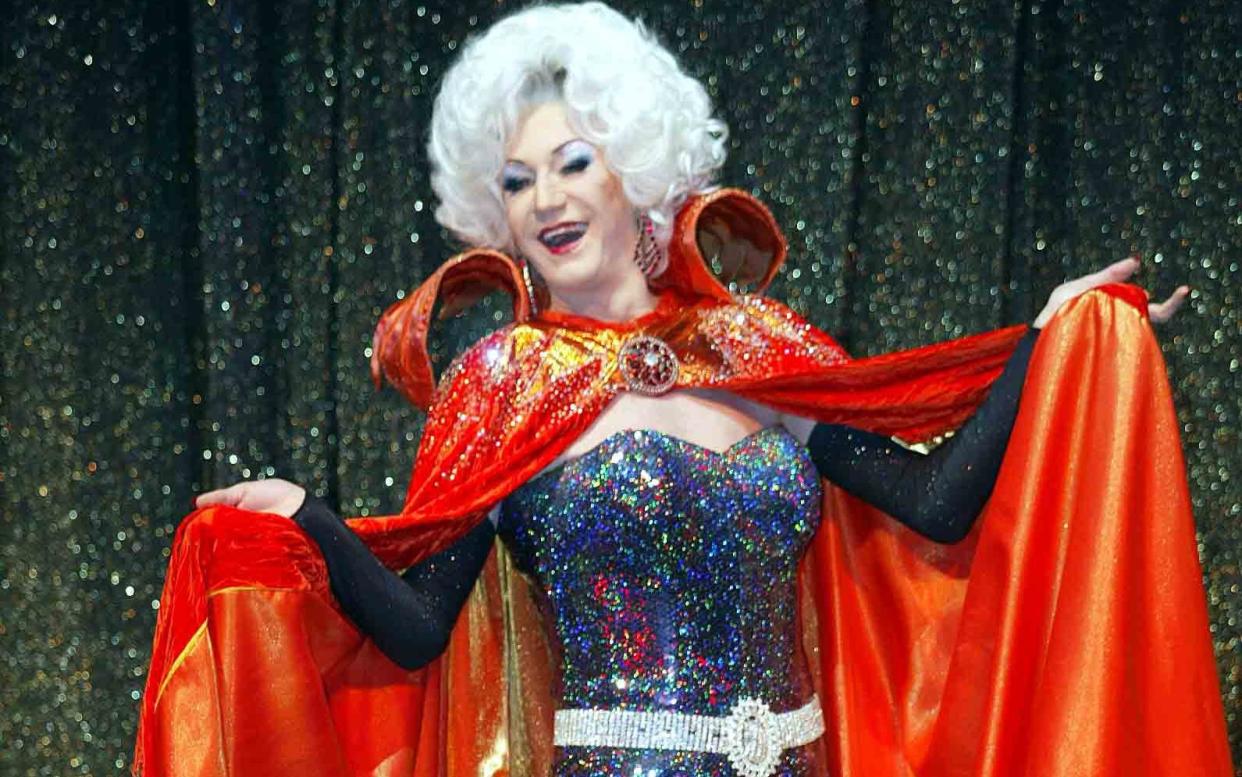Let’s not dismiss drag – Paul O’Grady made it political and poignant

Yesterday, Paul O’Grady’s death dominated the news agenda in a way which confirmed his status as someone beloved by the nation, a natural-born entertainer who was at home equally with celebrities and the general public. No one in the industry had a bad word to say about him, and my own fleeting encounter nearly 20 years ago suggested someone very quiet and very kind – a very long way from the acerbic Lily Savage, the drag persona which made his name long before he became an expert on dogs. Indeed, amid all the tributes we need to remember why O’Grady really matters – and it’s all bound up with Lily, a role which made him the single-most important exponent of drag in modern Britain.
From the start, Lily was different. O’Grady’s shtick was not to be fabulous but to be a little tarnished, a little rough around the edges (and based, affectionately, on his bus conductor aunt). Certainly, you can understand the need of drag artists merely to be glamorous – many cater to gay audiences, and at the time that O’Grady made his mark on the London gay scene in the 1980s, escapism was in short supply and drag acts offered a refuge to those affected by the routine queer bashing at the start of the decade (when skinheads scoured the streets for anyone who was different) and the despair precipitated by the Aids crisis at the end of it.
But O’Grady took it further. He used quick-witted Lily as a platform (often at his residency in London’s Vauxhall Tavern) to cast a sardonic eye on the moral panic stoked by the tabloids, and to oppose the restrictions of Section 28, a policy introduced by the Government in 1988 to ban any local authority’s promotion of homosexuality. Those under the age of 45 may not realise that this was an era of out-and-out assault on gay Britons, and Lily was a warrior, standing up for a community that was in danger of losing its voice.
Such was the power of Lily’s rhetoric that she soon became accepted by the comic mainstream and was nominated for a Perrier award. By the mid-1990s Lily was frequently on TV, too. This ubiquity cannot be over-estimated. Prior to this, drag (for your average Briton) was something you might occasionally witness at Christmas time when you went to the pantomime and saw someone dressed up as a dame, or watched Danny la Rue do a quick turn on The Good Old Days or Melvyn Hayes putting on a fright wig on It Ain’t Half Hot Mum. These were side acts to be sniggered at and no more. OK, Dame Edna Everage was on her way to becoming an international megastar, but this was tempered by the fact that everyone knew that Barry Humphries who played her was a married man, temporarily eroding some of the prejudices of his audience.
O’Grady, on the other hand, was unashamedly un-heterosexual which, to generations used to laughing at the camp mannerisms of the “is he or isn’t he?” Larry Grayson on The Generation Game, was a bolt from the blue.

Along with Julian Clary, who arrived like a beautiful, bedazzling butterfly (albeit one with a very naughty sense of humour) on ITV’s Trick or Treat in 1989, O’Grady was crucial in moving Britain on from its shameful treatment of gay men in the previous few years, and used a devastatingly effective humour to help banish more or less all trace of homophobia in the world of mass entertainment. By the time Lily Savage got the coveted Blankety Blank gig on primetime BBC One in 1997, nobody batted an eyelid. The bigots had, seemingly, lost.
Certainly not everyone was happy with O’Grady’s rise to stardom. Those who had been at the spit-and-sawdust end of the gay entertainment scene saw him as a sellout, but the fact is that O’Grady’s ascent was necessary. He ultimately had to sacrifice the political to break down boundaries. Lily, in her later years, tended to be simply bitchy (though often very funny). Why, she asked, did Charles leave Diana for Audrey Roberts from Coronation Street? It says a lot about our Queen that she and O’Grady subsequently became close friends.
All of this makes what has happened in the past few years seem very sad. We have now reached a point where O’Grady’s striving for tolerance feels like it has been in vain. Prejudice is back, and centre stage. We now live in an era where minority groups are pitted against each other. And indeed the idea of transvestism is now often in the firing line, having developed an awkward, unresolved relationship with the toxic trans debate. Added to this, some now argue that drag has become horribly passé (despite the ongoing success of RuPaul’s Drag Race), and some interpret it as misogynist.
On the right, there is the return to homophobia (or at least extreme social conservatism) in the States. Following the controversy over Drag Queen Story Hour (a public library event in which drag queens read books to children), battle lines have now been drawn in Tennessee and “adult cabaret performances” have been banned from public spaces. Once more, those who don’t adhere to the mainstream are being forced underground.
Come to think of it, the more entrenched opposing factions become, the more we need someone like Lily Savage back on our TV screens. She would have little truck with today’s culture warriors, and would probably be rather tart about their dress sense, too. Nor would the rednecks bother her either.
For the fact that Britain feels a long way from events in Tennessee we should be grateful, and in no small part we should be grateful to O’Grady, whose contribution to British cultural life is far greater than we ever gave him credit for.

